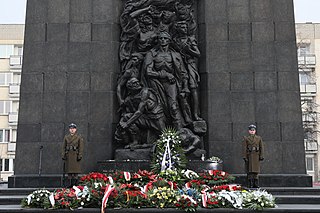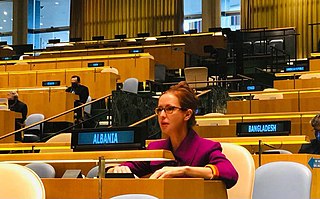
The United Nations Security Council (UNSC) is one of the six principal organs of the United Nations (UN), charged with ensuring international peace and security, recommending the admission of new UN members to the General Assembly, and approving any changes to the UN Charter. Its powers include establishing peacekeeping operations, enacting international sanctions, and authorizing military action. The UNSC is the only UN body with the authority to issue binding resolutions on member states.

The United Nations Interim Administration Mission in Kosovo (UNMIK) is the officially mandated mission of the United Nations in Kosovo. The UNMIK describes its mandate as being to "help the United Nations Security Council achieve an overall objective, namely, to ensure conditions for a peaceful and normal life for all inhabitants of Kosovo and advance regional stability in the western Balkans."
China is one of the charter members of the United Nations and is one of five permanent members of its Security Council.

The United Nations Mission for the Referendum in Western Sahara is the United Nations peacekeeping mission in Western Sahara, established in 1991 under United Nations Security Council Resolution 690 as part of the Settlement Plan, which had paved way for a cease-fire in the conflict between Morocco and the Polisario Front over the contested territory of Western Sahara.

International Holocaust Remembrance Day is an international memorial day on 27 January that commemorates the victims of the Holocaust, the genocide of European Jews by Nazi Germany between 1941 and 1945. 27 January was chosen to commemorate the date that Auschwitz concentration camp was liberated by the Red Army in 1945.

France has been a member of the United Nations (UN) since its foundation in 1945 and is one of the five nations, alongside the United States, China, Russia and the United Kingdom, that holds a permanent spot on the United Nations Security Council (UNSC), which is responsible for maintaining international peace and security. France has contributed to the organisation over the years through its leadership and sponsorship of various resolutions and other major UN bodies as well as being one of the largest-contributing states to both the general budget and to the peacekeeping operations budget. Several French Presidents have openly spoken of their support for the UN and its aims and there are clear links between France’s own policies and the values which the UN espouses, particularly concerning human rights. In the last decade, France has called for, proposed and supported various reforms on the UNSC and their Peacekeeping Operations (PKO). The UN, since its foundation, represents the core of France’s engagement with the multilateral international system.

Ferit Hoxha was the Permanent Representative of Albania to the United Nations, in New York, from 2009 through 2015.

United Nations Security Council resolution 1101, adopted on 28 March 1997, after reiterating its concern over the situation in Albania, the council established a multinational protection force in the country to create conditions to facilitate humanitarian assistance.

United Nations Security Council resolution 1114, adopted on 19 June 1997, after recalling Resolution 1101 (1997) on the situation in Albania, the Council authorised an extension to the multinational force in the country for a further 45 days, beginning on 28 June 1997.

United Nations Security Council resolution 1142, adopted unanimously on 4 December 1997, after recalling resolutions 1105 (1997) and 1110 (1997), the Council extended the mandate of the United Nations Preventive Deployment Force (UNPREDEP) in Macedonia until 31 August 1998.
United Nations Security Council resolution 1159, adopted unanimously on 27 March 1998, after reaffirming resolutions 1125 (1997), 1136 (1997), 1152 (1998) and 1155 (1998), regarding the situation in the Central African Republic, the council established the United Nations Mission in the Central African Republic (MINURCA).

United Nations Security Council resolution 1186, adopted unanimously on 21 July 1998, after recalling resolutions 1105 (1997) and 1110 (1997), the Council extended and strengthened the mandate of the United Nations Preventive Deployment Force (UNPREDEP) in Macedonia until 28 February 1999.
United Nations Security Council resolution 1264, adopted unanimously on 15 September 1999, after recalling previous resolutions on East Timor (Timor-Leste), the Council authorised the establishment of the multinational International Force for East Timor (INTERFET) to restore peace and security in the territory, facilitate humanitarian assistance and protect the United Nations Mission in East Timor (UNAMET).

United Nations Security Council Resolution 2003, adopted unanimously on July 29, 2011, after reaffirming all previous resolutions and statements on the situation in Sudan, the Council extended the mandate of the African Union – United Nations Hybrid Operation in Darfur (UNAMID) for a further 12 months until July 31, 2012.

The United Nations Mission in South Sudan (UNMISS) is a United Nations peacekeeping mission for the recently independent South Sudan, which became independent on 9 July 2011. UNMISS was established on 8 July 2011 by United Nations Security Council Resolution 1996 (2011). UNMISS is since December 2016 headed by Special Representative of the Secretary-General David Shearer who succeeded Ellen Margrethe Løj. As of May 2019, it is composed of 15,000 military personnel, 1,800 police, and 2,800 civilian workers. It is headquartered in the South Sudanese capital of Juba.
The African-led International Support Mission to the Central African Republic is an African Union peacekeeping mission to the Central African Republic. MISCA was established on 5 December 2013 by United Nations Security Council resolution 2127 to stabilise the country as a result of the Central African Republic conflict under the Djotodia administration and following the 2013 Central African Republic coup d'état.
Malaysia became the 82nd member of the United Nations on 17 September 1957. Malaysia has held a rotational non-permanent seat on the United Nations Security Council for four terms, and has participated in over 30 United Nations peacekeeping missions since October 1960.
The Republic of Singapore officially became the 117th member of the United Nations (UN) after its independence on August 9, 1965. From 2001 to 2002, Singapore held a rotational seat on the United Nations Security Council and has participated in UN peacekeeping/observer missions in Kuwait, Angola, Kenya, Cambodia and Timor Leste.

Besiana Kadare is an Albanian diplomat. She serves as the Ambassador Extraordinary and Plenipotentiary Permanent Representative of Albania to the United Nations, a Vice President of the United Nations General Assembly for its 75th session, and Albania's Ambassador to Cuba. She is the daughter of writers Helena Kadare and Ismail Kadare.

The Office of the Special Representative of the Secretary-General on Sexual Violence in Conflict (OSRSG-SVC), is an office of the United Nations Secretariat tasked with serving the United Nations' spokesperson and political advocate on conflict-related sexual violence, the Special Representative of the Secretary-General on Sexual Violence in Conflict (SRSG-SVC). The Special Representative holds the rank of Under-Secretary-General of the United Nations and chairs the UN Action Against Sexual Violence in Conflict. The mandate of the SRSG-SVC was established by Security Council Resolution 1888, introduced by Hillary Clinton, and the first Special Representative, Margot Wallström, took office in 2010. The current Special Representative is Pramila Patten of Mauritius, who was appointed by United Nations Secretary General António Guterres in April 2017. The work of the SRSG-SVC is supported by the United Nations Team of Experts on the Rule of Law/Sexual Violence in Conflict, co-led by the Department of Peacekeeping Operations (DPKO), Office of the High Commissioner for Human Rights (OHCHR) and the United Nations Development Programme (UNDP), also established under Security Council Resolution 1888.


![Evacuations in the Alba[]nian capital of Tirana after Resolutions 1101 and 1114 Operation Silver Wake.JPG](http://upload.wikimedia.org/wikipedia/commons/thumb/6/65/Operation_Silver_Wake.JPG/218px-Operation_Silver_Wake.JPG)











